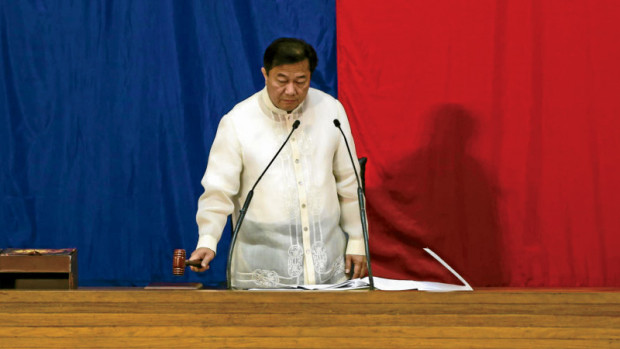Just after the Sandiganbayan ordered the suspension for graft of two incumbent congressmen, Speaker Pantaleon Alvarez filed a bill seeking to prevent the anti-graft court from preventively suspending incumbent officials for offenses committed during their previously held positions.
Alvarez filed House Bill 3605 which seeks to amend Section 13 of Republic Act 3019 or the Anti-Graft and Corrupt Practices Act that allows the anti-graft court to preventively suspend incumbent officials charged with a valid information of graft or violation of the Revised Penal Code involving fraud of government funds.
Ombudsman prosecutors have been citing Section 13 in asking the court to suspend public officials charged with graft as a matter of course.
The prosecutors said officials charged with graft should be preventively suspended to prevent them from using his or her position to tamper with evidence or intimidate witnesses.
The Section 13 reads: “Any incumbent public officer against whom any criminal prosecution under a valid information under this Act or under Title Seven Book II of the Revised Penal Code or for any offense involving fraud upon government or public funds or property whether as a simple or as complex offense and in whatever stage of execution and mode of participation, is pending in court shall be suspended from office.”
The bill seeks to insert the phrase “provided, that in case such incumbent public officer is no longer connected with the office wherein the offense charged was committed, the preventive suspension order shall no longer be implemented.”
The bill was co-authored by Majority Floor Leader Ilocos Norte Rep. Rudy Fariñas, Minority Leader Quezon Rep. Danilo Suarez and Kabayan Rep. Harry Roque.
In the explanatory note, the authors said public officials in their new government posts would no longer be in a position to tamper with evidence or intimidate witnesses.
“As preventive suspension is imposed to prevent an accused from influencing potential witnesses or tampering with records, the change in circumstances of the public officer effectively removes this threat, making the provision in line with the spirit and intent of the law,” the authors said.
Camarines Sur Rep. Luis Raymund Villafuerte Jr. was suspended for graft as he faces trial over the allegedly anomalous procurement of P20 million worth of petroleum products for the provincial government when he was Camarines Sur governor in 2010.
READ: CamSur Rep. Villafuerte suspended for 90 days over graft case
On the other hand, Pangasinan Rep. Amado Espino Jr. was suspended for a graft charge for allegedly allowing firms to operate illegal black sand mining in the province when he was Pangasinan governor in 2011.
READ: Pangasinan Rep. Espino suspended for graft over black sand mining
Prosecutors also asked the court to suspend Muntinlupa Rep. Ruffy Biazon, a former customs commissioner, who faces graft, malversation and direct bribery raps for his alleged involvement in the pork barrel scam.
READ: Prosecutors seek Biazon’s suspension over pork barrel scam
The issue has so wracked Congress that Alvarez called for an all-member caucus to discuss whether or not to implement the suspension order against his colleagues.
Alvarez later filed a compliance before the court informing the Sandiganbayan justices that he had referred the suspension orders to the House rules committee.
READ: House yet to implement solons’ suspension for graft | Alvarez calls for caucus meeting on lawmakers’ graft suspension
Fariñas, who chairs the rules committee, has said the lower house in its history never implemented suspension orders from the Sandiganbayan because Congress stood pat on its power to discipline its members.
Fariñas cited a clash in opinion in the anti-graft law mandating the preventive suspension and the constitutional mandate of Congress to discipline its own ranks.
According to Article VI, Section 16 of the 1987 Constitution, “Each House may determine the rules of its proceedings, punish its Members for disorderly behavior, and, with the concurrence of two-thirds of all its Members, suspend or expel a Member. A penalty for suspension, when imposed, shall not exceed sixty days.”
“The historical practice is that the House has never implemented the suspension order because it stood pat on its power to suspend its own members,” Fariñas then said. RAM/rga
READ: House to protect own image amid graft suspension of two solons
